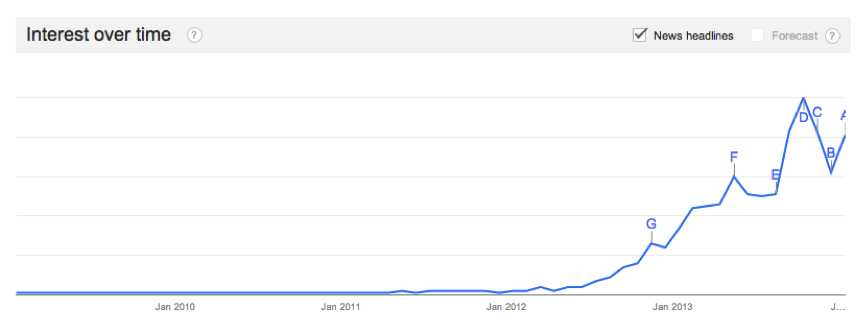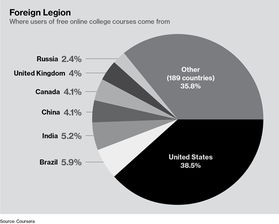
Are MOOCs as hot as they are predicted to be? Well it depends what you read. I’ve just read an article entitled, “Doubts About MOOCs Continue to Rise, Survey Finds” which is based on research done in the USA in 2013. The research surveyed 2,831 universities about online education. The article says things such as:
“Academic leaders increasingly think that massive open online courses are not sustainable for the institutions that offer them and will ‘cause confusion about higher-education degrees.’"
“In 2012, 26 percent of academic leaders disagreed that MOOCs were ‘a sustainable method for offering courses.’ In 2013 that number leapt to 39 percent.”
"The chief academic officers at institutions with the greatest experience and exposure to traditional online instruction are the least likely to believe in the long-term future of MOOCs"
Yet this needs to be set against the rapidly rising interest in MOOCs. The following chart from Google Trends shows how interest in the term MOOCs has risen sharply over the past few years and enrollments are rising into the tens of millions.
What appears to be interesting is that on the one side the “academic leaders” are casting doubt on MOOCs but on the other side there is a rising interest driven by the consumers/learners. These leaders predict the demise of MOOCs, they worry about students’ ability to stay focused in a MOOC, and increasingly believe it will not replace current models of education. This reminds me of some other famous sentiments made by academic leaders in the past…
“When the Paris Exhibition closes, electric light will close with it and no more will be heard of it”. Professor Erasmus Wilson, Oxford University, 1878
"Students today depend on paper too much. They don't know how to write on a slate without getting chalk dust all over themselves. They can't clean a slate properly. What will they do when they run out of paper?" Principal's publication, 1815
"Students today depend too much upon ink. They don't know how to use a pen knife to sharpen a pencil. Pen and ink will never replace the pencil." Journal of the National Association of Teachers, 1907
Sure, MOOCs might not be the education model of the future, but to dismiss them at this early stage, especially with their meteoric rise in popularity, is foolish. One of the things we are learning from the Internet is that many models only make sense retrospectively. Take the wiki phenomenon, made famous by Wikipedia. How can a collaborative encyclopedia ever exist, where anyone can change the content? Surely the only way to have an encyclopedia is when experts put it together and it is published through stringent controls? Well, that’s what Encyclopedia Britannica and others thought too. In 2012, Encyclopedia Britannica, the bastion of traditional encyclopedias ended its printed version, after dropping from 120,000 copies sold in 1990, to just 8,000 in 2010.Wikipedia (ironically) reporting on the history of Encyclopedia Britannica, says the following;
“In March 2012, Britannica's president, Jorge Cauz, announced that it would not produce any new print editions of the encyclopaedia, with the 2010 15th edition being the last.”
Somehow, despite lots of initial resistance to the concept of a collaborative encyclopedia, Wikipedia has grown in acceptance, both at schools and (more slowly) at universities.
"I was categorically against my students using it altogether. I would explain that there are simply better, more trustworthy places to find information," says Shulman. "Now, I'm more open to what Wikipedia offers. Saying it's off-limits won't stop students from using it, so I've switched to helping students understand when it's useful and when it's not." (Prof. Shulman, Case Western Reserve University)
So what about MOOCs? Are academics discounting them just because we can’t figure out all the answers? Are we talking about their imminent demise just because we can’t see how they could ever actually work? Paradigm changes, by their very nature mean we need to take another perspective. Looking at MOOCs from our traditional funding, pedagogic, and administrative perspectives, is bound to make us balk. It did the same thing not so long ago when people predicted the impact of the Internet of daily life. The following extracts from a Newsweek article, by Clifford Stoll in 1995, entitled "The Internet? Bah!" just shows how wrong we can get it!
“The Internet? Bah!” Newsweek, February 27, 1995, by Clifford Stoll:
“Visionaries see a future of telecommuting workers, interactive libraries and multimedia classrooms. They speak of electronic town meetings and virtual communities. Commerce and business will shift from offices and malls to networks and modems…Baloney. Do our computer pundits lack all common sense? The truth is no online database will replace your daily newspaper, no CD-ROM can take the place of a competent teacher…Try reading a book on disc. At best, it’s an unpleasant chore: the myopic glow of a clunky computer replaces the friendly pages of a book. And you can’t tote that laptop to the beach. Yet Nicholas Negroponte, director of the MIT Media Lab, predicts that we’ll soon buy books and newspapers straight over the Internet. Uh, sure...So how come my local mall does more business in an afternoon than the entire Internet handles in a month? Even if there were a trustworthy way to send money over the Internet—which there isn’t—the network is missing a most essential ingredient of capitalism: salespeople…“While the Internet beckons brightly, seductively flashing an icon of knowledge-as-power, this nonplace lures us to surrender our time on earth. A poor substitute it is, this virtual reality where frustration is legion and where—in the holy names of Education and Progress—important aspects of human interactions are relentlessly devalued.”
We chuckle now from the comfort of our Internet-induced paradigm-adjusted world, reading this online, buying more online than offline. Yet how steeped are we in our own myopic education paradigms. Do we scoff at “Visionaries seeing a future of students learning in virtual MOOC communities”? Do we laugh saying “The truth is no MOOC will replace your traditional university, no online learning can take the place of a competent teacher.” And finally we dismiss it saying it is “A poor substitute with its virtual learning, where completion rates and administrative issues are legion – and where in the holy names of Education and Progress – important aspects of human interactions are relentlessly devalued.”
Let's be careful as learned academics huddling together in our enclaves, while poring over our research results, of making bold proclamations about the demise of MOOCs which sound somewhat akin to the (mis)quote from Mark Twain - "“Reports of my death have been greatly exaggerated”.
Something BIG is coming, let’s be brave enough to at least look out the box, even if we are unsure, or afraid, to step out of the box just yet. However, either way, change is imminent in our long-overdue world of academia, regardless of whether we say “MOOCs? Bah!” or not.
Let's be careful as learned academics huddling together in our enclaves, while poring over our research results, of making bold proclamations about the demise of MOOCs which sound somewhat akin to the (mis)quote from Mark Twain - "“Reports of my death have been greatly exaggerated”.
Something BIG is coming, let’s be brave enough to at least look out the box, even if we are unsure, or afraid, to step out of the box just yet. However, either way, change is imminent in our long-overdue world of academia, regardless of whether we say “MOOCs? Bah!” or not.





 RSS Feed
RSS Feed